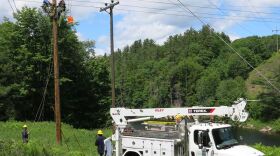Earlier this summer, the state of New Hampshire allocated about $14 million dollars in federal CARES Act funding to projects that would provide high speed internet to underserved communities across the state.
With the December 15 fast approaching, some towns say they should be done with their projects just under the wire.
“It’s gonna be a close one,” said Nik Coates, Bristol’s town administrator. Bristol requested about $2 million to build out 24 miles of fiber internet to about 400 residences.
Coates says all the fiber cable has been strung, and now it’s a matter of putting in the right equipment so that the fiber can be connected at people’s homes.
For the past few years, Bristol has been working to find ways to improve residents’ internet access, and the COVID-19 pandemic has only underscored the need for fast, reliable internet at home.
“It's always been really the most important thing,” Coates said. “How do we allow people to make good choices themselves with options and not just be stuck with one particular option that’s fed to them by a private company?”
The New Hampshire Electric Cooperative, another recipient of the Connecting New Hampshire Emergency Broadband Program, says it’s also on track to complete its project by the December deadline.
With $6.7 million, the cooperative is building out fiber internet to 900 homes in Lempster, Colebrook, Stewartstown and Clarksville.
Robert Cruickshank is the lead executive of the Co-op’s broadband efforts. He says the project is on schedule to meet the December 15 completion deadline.
“And we’ve already sent postcards to our first 40 customers, where we’ve completed passing in front of their home, and we’re ready to hook them up,” he said. “We’re sending more postcards as we build out.”
In addition to building out the fiber network, the Co-op will also deliver the internet service for those 900 homes.
This project fits in with a broader shift happening at the Co-op. Earlier this fall, the Co-op’s members approved adding rural broadband service to the utility’s mission.
“The CARES project is really a way to sharpen our game,” Cruickshank said. “We are committed to getting to all of our members across New Hampshire. We want to make sure they know we’re coming.”
The Co-op serves about 115 communities across the state.
Cruickshank says that these last few months have been a major boost in improving broadband state-wide, and that the cooperative wants to collaborate with towns who are working on broadband initatives.
Coates, Bristol’s town administrator, says he’s been getting calls from officials in nearby towns frequently asking how they could replicate something like Bristol’s project.
He says he’s hoping there can be more regional efforts to continue bringing broadband to rural areas.








